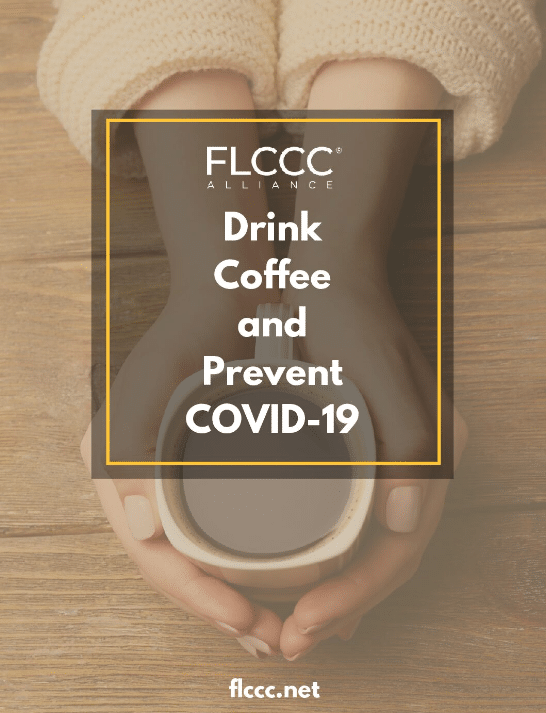We love a morning cup of joe. But coffee benefits our health too! From cancer to COVID, coffee could be one of the healthiest drinks around.

Coffee’s global popularity is undeniable with over 2.25 billion cups enjoyed daily worldwide. Beyond its widespread appeal coffee also offers significant health benefits.
Research indicates that regular coffee consumption can reduce the risk of various illnesses such as:
- COVID-19
- Alzheimer’s disease
- Parkinson’s disease
- Stroke
- Type II diabetes.
In essence, enjoying a cup of coffee can be more than just a pleasurable experience; it can also contribute positively to your overall health!
Whether you take it black or bulletproof, coffee should be part of your routine. To get you started, we’ve got all the info you need right here in this coffee infographic.
Top Health Benefits to Drinking Coffee
Coffee has a long history of being consumed not just for its rich flavor and energizing effects, but also for its medicinal properties. It was discovered and drunk first in Ethiopia in the 9th century.
Around the same time, Islamic physicians like Rhazes and Avicenna began describing coffee’s beneficial effects. They claimed coffee was helpful for including digestive aid and cleansing the skin.
By the 17th century, coffee was seen as an alternative to alcohol, driving its popularity across the Middle East and Europe. It was even used to treat ailments, from colds to bronchitis.
Along with the scientific revolution, coffee curiosity grew and, by the 20th century, the discovery of enzymes and their role in metabolism furthered the understanding of health effects.
Let’s look at the top benefits of coffee for our health. A cup a day goes a long way!
- Physical Performance
- Heart Health
- Cancer risk
- COVID-19
- Alzheimer’s Disease
- Depression
- Stroke
- Memory
1. Physical Performance
If you’re looking for a pre-workout boost look no further than coffee. Coffee contains caffeine which is a natural stimulant and has been shown to improve physical performance by increasing alertness, reducing fatigue, and overall increasing physical performance by 11-12%.
So if you’re looking to improve your workout results, drink a cup of caffeinated coffee before hitting the gym!
2. Heart Health
Studies have shown that coffee is good for your heart. In fact, coffee drinkers have a 20% lower risk of heart disease than non-coffee drinkers. So if you’re worried about your heart health, drinking coffee may help reduce your risk of heart disease.
One caveat: even moderate caffeine intake can impact your blood pressure. If you’ve struggled with that, you may want to ease into any new coffee intake routine. Better yet, measure your blood pressure after drinking coffee to test the effects!
3. Cancer risk
Coffee has been shown to reduce your risk of some types of cancer. In fact, one study showed that people who drank four cups of coffee per day had a 20% lower risk of cancer than those who didn’t drink any coffee at all.
So much power in one little coffee bean!
4. COVID-19
Coffee has been shown to inhibit multiple variants of the SARS-CoV-2 infection by restraining the binding of the SARS-CoV-2 spike protein to human angiotensin-converting enzyme 2 (ACE2) and reducing transmembrane serine protease 2 (TMPRSS2) and cathepsin L (CTSL) activity.
The mechanism of action described above might seem complicated, but it’s actually very simple. Coffee works by blocking the COVID-19 virus from binding to cells in our body, making it more difficult for the virus to proliferate and make us sick.
5. Alzheimer’s Disease
Alzheimer’s disease is the most common form of dementia and it affects millions of people worldwide. But did you know that drinking coffee can help prevent Alzheimer’s disease and improve memory?
Studies have shown that people who drink three or more cups of coffee per day are 65% less likely to develop Alzheimer’s disease than those who don’t drink any coffee at all.
6. Depression
Depression is a serious mental illness that affects millions of people worldwide every year. Studies have shown that people who drink coffee are at a lower risk for depression. Coffee is also a powerful mood booster.
As we know, coffee has antioxidant and anti-inflammatory properties. But caffeine’s blocking effect on brain receptors has interesting potential too. It’s believed that the receptors responsible for fatigue or depressed feelings are blocked by coffee! That’s another way to stay energized.
7. Stroke
Strokes are medical emergencies that can lead to long-term brain damage and even death. Studies have shown that people who drink two or more cups of coffee per day are 30% less likely to die from a stroke than those who don’t drink any coffee at all.
8. Memory
The caffeine in coffee helps to improve cognitive function and memory while the antioxidants also help to protect the brain from damage. In addition, coffee can help to increase the blood flow to the brain which is important for keeping the mind healthy and functioning properly.
How to Enjoy Coffee for Health Benefits
Moderation is Key
The general consensus among health experts is that moderate coffee consumption is safe for most people. This typically translates to about 3 to 4 cups per day providing up to 400 milligrams of caffeine. However, individual tolerance to caffeine can vary. Some people may experience side effects like jitteriness, insomnia, or heart palpitations even at lower amounts.
Mind the Timing
Avoid coffee late in the day or in the evening if it affects your sleep. Poor sleep can negate the health benefits of coffee.
Watch What You Add
Be cautious about adding high amounts of sugar, flavored creamers, or flavored syrups as these can add extra sugar, calories, and reduce the overall health benefits. If you spike your blood sugar every time you drink coffee, that will negate the overall health effects.
Full creamer, coconut oil, MCT oil, and butter are the best choices as they also have added health benefits with your cup of coffee.
Opt for Quality
Choose high-quality organic coffee when possible to avoid contaminants like pesticides.
Consider Brewing Methods
Certain brewing methods like using a paper filter can remove cafestol, a compound in coffee that can increase cholesterol levels. Espresso and French press, for example, do not remove cafestol.

How Much to Drink to Get Coffee’s Benefits
FLCCC has added coffee to our I-PREVENT Guidelines aimed at preventing COVID-19, influenza, and RSV. We also talk about coffee in our Eat Well Guide. Here’s a summary of what you’ll find in those resources.
Recommended Amounts
The “perfect” dose of coffee is likely different for different people. Factors like body weight, caffeine tolerance, and anxiety levels should be considered. As with most nutritional
One to two cups per day of coffee reduces the risk and severity of infection with COVID-19 and its variants. Decaffeinated coffee has similar effects to filtered caffeinated coffee with the suppressive activity not being affected by coffee additives.
Coffee and Intermittent Fasting
There’s emerging evidence that coffee drinkers can reduce their risk of developing Type II diabetes just by drinking their favorite drink. But there’s another related practice that, when paired with coffee, can help people completely reverse it.
That practice is called intermittent fasting. The reason that coffee goes well with fasting is that coffee and fasting both stimulate autophagy. Autophagy is great for diabetes because it improves insulin sensitivity. Fasting also has the double benefit of lowering blood sugar levels.
👉 Learn more: Complete Guide to Intermittent Fasting
Specific Conditions
- Pregnant Women: Limit coffee to about 1 cup per day (about 200 mg of caffeine) due to potential impact on fetal development.
- People with Anxiety or Heart Issues: May need to consume less depending on how they react to caffeine.
- Type II Diabetes, Parkinson’s, and Alzheimer’s: Some studies suggest that higher consumption (3-4 cups) might be beneficial but this should be balanced against individual tolerance and overall health.



